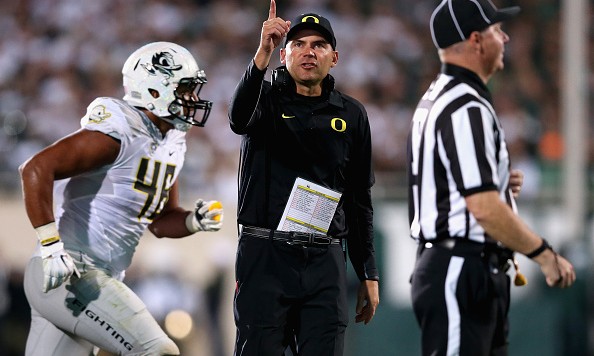Follow TSS on Twitter @TheStudentSect
26-7.
Normally when you hold such a record, there’s no reason to worry about anything, nor should you be receiving any criticism for what you’re doing. It’s like a chef who cooks a mean steak and everyone at Outback loves it.
The problem is, he takes a job at a fine steakhouse and the expectations become a little different.
62-20.
I promise, this isn’t all about numbers. That’s the score by which Oregon lost at home … to Utah … this past weekend. The shock in that number is amazing. Oregon basically looks like an FCS team that Utah paid $1 million to show up and take a whipping.
Only Oregon isn’t FCS and Utah didn’t pay the Ducks, nor did it even happen on Utah’s turf.
Is coach Mark Helfrich really in some kind of very early, exploratory trouble?
The rub is this: Oregon has entered into the temple of expectation, where just winning 9-10 games per season used to satisfy folks, but those days are long gone. Oregon expects to compete for championships. Helfrich, who has cut his coaching teeth as the offensive guru behind the Ducks’ fast-paced offense since 2009, right or wrong, is viewed as successful simply because he was attached to assumed genius Chip Kelly (now with the NFL’s Philadelphia Eagles).
It’s rather ridiculous to think that a coach who had his team within a game of winning a title last season would be taking heavy criticism, but sports and coaching are no longer games of patience. That, and 62-20 is hideous. You simply can’t lose like that.
Right or wrong, it suggests your team has checked out on you. (It doesn’t prove it — note the use of specific words — but it does suggest it. We’ll see how the Ducks respond to this.)
What makes that point a big issue? For the most part, these are Helfrich’s recruits. The guys on the team are a reasonable gauge of the talent one should expect Oregon to have moving forward. It’s disingenuous to suggest that because Helfrich isn’t a big coaching name, he can’t bring elite talent there. Kelly was a mostly little-known guy from New Hampshire when he took the Oregon post.
This, though, is the first year Helfrich has had to live without Marcus Mariota, and whatever quarterback talent was in the stable was deemed to be incapable of leading the Ducks, compared to a transfer from Eastern Washington who had very little time to acclimate himself to the team from culture and chemistry standpoints.
I could personally be totally wrong, but the vibe around college football and specifically the left coast feels like Helfrich’s program isn’t scaring anyone the way Oregon is used to scaring folks. Even with the playoff berth last year, something isn’t fully settled in terms of buy-in.
Oregon is starving for a title. The Ducks are the default “best college football program right now that hasn’t won a title,” and they want off that list from the top down.
Coaching is hard for many reasons, one primary reason being that sometimes the perception is that it’s all the coach. In certain situations, perception creates the unfair belief that no matter what the coach does, he/she has the players such that any old Tom, Dick, and Harry could be given some free clothes and a sideline pass and achieve the same lofty results.
How certain coaches get lumped into each category is beyond the scope of my knowledge. What isn’t beyond the scope of my knowledge is how coaching is evaluated, which is by wins and losses — and then, if this is a math problem, multiplied by expectations:
Here’s the formula: C = W-L (Ex).
The optimist in you says: “It’s merely one game. Everyone has games in which it doesn’t show up, and this one was just an aberration. We’ll get it next week.”
The pessimist says: “Yeah, it’s one game, but losing by 42 points at home? That clearly is a gap of talent, and they’re not playing the Pittsburgh Steelers … it’s Utah. If we want to continue to have a gap of talent, I guess we shouldn’t worry.”
The realist says: “It’s somewhere in between competing for titles consistently and losing by 42 at home, and since that’s a wide chasm, I feel good about being right.”
Humor me here, and let’s say the NFL’s Philadelphia Eagles continue to suck. Oregon wins about 7-8 games. Chip Kelly gets fired. Is Oregon making the call like a girl still hung up on her ex that left her after seeing on Facebook that he’s newly single and moving back to town?
It’s hard to tell, and it’s even harder to tell if this all is just an overreaction to one game rather than a systemic issue.
The only thing that’s certain in all of this is that Oregon no longer exists as a program accepting anything less than playoff contention, and that if the Ducks are not at that level, someone is taking the fall.
Helfrich is in the unenviable position of replacing someone people thought was a resident genius. You’re only as good as who you’re replacing, as we all know. Find a girl whose last boyfriend was a lazy, unemployed slug, and her parents will love you. Find one whose last boyfriend was a doctor, and good luck to you.
The rope is thin at programs with expectations. That’s part of the gig. Mark Helfrich — if he doesn’t turn things around in the coming weeks — could soon feel that particular form of pressure in Eugene.

